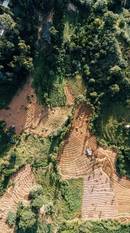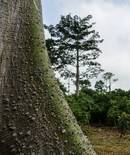News

The Bangladesh Forest Department, with technical support from the Food and Agriculture Organization (FAO) of the United Nations, and in collaboration with universities, is finalizing the field data collection for the Bangladesh Forest Inventory. With the objective to re-locate the field inventory plots and monitor forest changes over time, the latest technological advances are used.
Effective monitoring depends wholly on the ability to re-locate the exact centre of the plots after several years between visits so that changes can be accurately recorded.
Several approaches are used to re-locate the plots, such as recording the geographic coordinates of the plot centre using...

Access to satellite data and cutting-edge geospatial technologies will be broadened thanks to deeper collaboration between FAO and Norway, whose International Climate and Forest Initiative (NICFI) agreed to scale up an innovative FAO digital platform that helps countries measure, monitor and report on their forests and land use.
The $6 million, three-year project, announced during the Oslo Tropical Forest Forum, will allow for boosting the power and reach of FAO's innovative forest monitoring platform, SEPAL (System for Earth Observation Data Access, Processing and Analysis for Land Monitoring).
The easy-to-use platform offers developing countries unparalleled access to granular satellite data and super computing power, paving the way for...

With the objective to reduce emissions from deforestation and forest degradation and enhance carbon sequestration from afforestation and reforestation activities, the Government of Bangladesh is developing the Forest Reference Level for the implementation of REDD+ mechanism under the United Nations Framework Convention on Climate Change (UNFCCC). The UNFCCC has defined Forest Reference Level as benchmark for assessing country's performance in implementing REDD+ activities. REDD+ results compare greenhouse gas (GHG) emissions during REDD+ implementation against the reference level.
On 11 April 2018, the Bangladesh Forest Department, with technical support from FAO and the UN-REDD programme, organized a national consultation on proposed Forest Reference Levels (FRL) for...

More than 1,200 participants from government, business, civil society and the research community gathered on 23–25 April in Yogyakarta, Indonesia to take part in the 3rd Asia-Pacific Rainforest Summit (APRS) 2018. Co-hosted by the Indonesian Government with the support of the Australian Government, and in partnership with the Center for International Forestry Research (CIFOR), the event followed up on the success of the APRS 2016 held in Brunei Darussalam and the APRS 2014 held in Australia. The APRS 2018 provided a forum for governmental and non-governmental participants from 40 countries across Asia-Pacific to discuss the most pressing issues facing the...

In case you haven’t heard of it yet, there’s a place to go when you face a challenge related to forest governance in your REDD+ -related work.
With 494 members from 78 countries, the online discussion group on REDD+ and Forest Governance – or the ‘D-Group’ as it is referred to – is a popular forum for informal exchange of information and ideas on issues of fundamental importance to the success of REDD+. Often the best advice can come from a peer who has faced a similar issue, sometimes in a distant country. The D-Group aims to facilitate the sharing...

